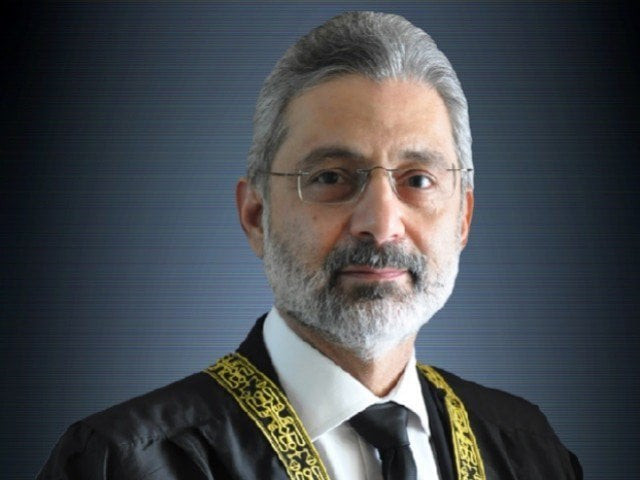Justice Isa reference tainted with mala fide in law: SC
Apex court issues 173-page detailed verdict four months after quashing a presidential reference against the judge

The top court on Friday declared that the presidential reference filed against Supreme Court judge Justice Qazi Faez Isa is “tainted with mala fide in law”, while making strong comments against the president, the federal minister for law and the former attorney general for Pakistan (AGP).
“Although the preparation and framing of the reference against the petitioner [Justice Isa] is not patently motivated with malice in fact, the scale and degree of the illegalities are such that the reference is deemed to be tainted with mala fide in law.
“For this reason, the reference is hereby quashed,” said the 173-page detailed judgment authored by future Chief Justice of Pakistan Umar Ata Bandial and endorsed by six more judges.
A 10-judge full court on June 19 quashed the presidential reference that sought Justice Isa’s removal in view of his failure to mention his family members’ London properties in his wealth statement.
In a rare move, Justice Isa unveils assets details
In its short order, the bench had referred to the matter to the Federal Board of Revenue (FBR), asking it to proceed against Justice Isa’s spouse and children and to submit a report to the Supreme Judicial Council (SJC), the only constitutional forum that can hold a superior court judge accountable.
While the FBR has slapped a Rs35m tax penalty on Sarina Isa, the wife of Justice Qazi Faez Isa, to the consternation of the latter, the apex court has unveiled the detailed verdict of the majority judges.
Interestingly, two members of the bench – Justice Maqbool Baqar and Justice Syed Mansoor Ali Shah – who were in minority, have yet to issue their opinions on quashing the presidential reference.
Crux of the ruling is that the majority judges quashed the presidential reference on the basis of “malafide in law” and not “malafide in facts”.
There is no adverse finding against the military establishment. There are harsh comments about President Dr Arif Alvi, Minister for Law Dr Farogh Naseem and the former AGP Anwar Mansoor Khan. The court has, however, stopped short of passing directions against them.
The judgment did not endorse Justice Isa contention on malafide in facts, surveillance of his family members, legality of the Assets Recovery Unit (ARU) and alleged media campaign against him etc.
The judgment noted that absence of malice in fact in the filing of the reference is reaffirmed by the petitioner’s admission that the London properties are indeed owned by his wife and children.
“This is because it is now well established in other areas of the law that an allegation of malice in fact gets defeated if it is proved that a complaint levelled against a person is true. Accordingly, we hold that the allegations of malice in fact levelled by the petitioner against the respondents fail.”
The court also rejecting Justice Isa allegation about surveillance of his family members, noted that surveillance primarily involves the monitoring or recording of a person’s movements, conversations or other activities and communication.
“However, in the present case the learned counsel for the petitioner has not produced any evidence before us which demonstrates that either the petitioner or his family has been monitored or their communications have been intercepted.”
The court also declared that there is neither any fatal defect in creation of the ARU nor is there any unlawfulness in the appointment of Mirza Shahzad Akbar as the PM’s aide on accountability.
Legal defect
Pointing out defects of the reference, the judgment noted that no authorization for investigating the affairs of the petitioner was given by the president and the prime minister.
Instead the authorization of the minister for law was obtained and no notice was issued to Isa’s wife as required under Section 116(1) of the Ordinance prior to the filing of the reference.
It said Justice Isa was presumed to be under the obligation to declare the assets of his independent wife and adult children on the basis of an unsettled and disputed interpretation of Section 116(1)(b).
The court said there was neither any evidence nor the nomination of a predicate offence in the reference to support the allegation of money laundering against the petitioner.
“Likewise, there was no evidence that the petitioner had violated the regime under FERA [Foreign Exchange Regulation Act, 1947] and even the relevant provisions from the said law were not specified in the reference.”
The judgment said the president received inadmissible advice from the AGP and the law minister – the chief architects of the reference – on the strengths and weaknesses of the reference.
The president did not get considered, fair and objective advice from a third party on the questions of law noted in the reference and the he failed to notice its various legal and procedural defects.
“The president in forming his opinion sought the advice of the law minister and the AGP, both of whom were involved in the preparation of the reference and therefore had a conflict of interest.
“Additionally, we have held under the heading ‘Validity of the Allegations in the Reference’ that the accusations against the petitioner have been made prematurely in the absence of statutory notice to Mrs Isa to explain her sources of funds.”
The court said there was no evidence to support the allegations made under FERA and the Anti-Money Laundering Act (AMLA) 2010.
“Both these facts went unnoticed by the president. Consequently, keeping in view these circumstances, we find that the independent application of mind by the president is lacking in the present case.
“Instead he has followed the advice tendered to him without ascertaining its correctness. This is contrary to the requirements of both Article 209(5) and Article 48(1) of the Constitution and therefore renders the reference defective,” it added.
It said the illegal acts of the respondents depict their utter disregard of the law. Filing a reference under Article 209 of the Constitution that is signed by the president and which presents a charge sheet against a judge of the superior courts is a matter requiring utmost prudence and caution by its framers.
However, in the present case the actions of the respondents have violated not only the express provisions of the Constitution, the rules of business (ROB), the ordinance and AMLA but have also ignored the law laid down in the CJP case (supra) which specifically set out certain safeguards to protect superior court judges from arbitrary actions of the executive.
“Therefore in essence, the respondents have paid scant attention to the mandate of the relevant laws governing the field of presidential references. In these circumstances, the errors committed by them in the preparation and framing of the reference cannot be termed as mere illegalities.”
The court said a presidential reference cannot be filed on assumptions. However, in the present case, the allegation against the SC judge of violating the provisions of FERA is “an unsubstantiated assumption neither backed by evidence nor supported by the relevant rule that was allegedly breached.”
The judgment noted that in the present case no finding of malice in fact has been given. It is true that the reference suffers from grave legal defects. But the consequences of illegality of an impugned action are different from those following a finding of malice in fact.
The illegalities in the present reference are a result of its careless and casual preparation. These errors or defects do not erase Sarina Isa’s ownership of the London properties, the primary fact which forms the basis of the reference and which is not denied by the petitioner.
“Whilst the ownership of the London properties is not disputed, the source of funds for their purchase and the mode by which these funds were transferred abroad require explanation.
“Otherwise, an unexplained investment by the spouse of a judge of the superior courts, who is a holder of public office, compromises the integrity of the learned judge and ultimately the probity and credibility of the institution which he serves,” said the judgment.
It said the court adopted impartial and transparent route of allowing Sarina Isa and her children to disclose the source of their funds to the relevant authorities, namely, the FBR.
“The matter of undeclared and unexplained foreign wealth of public office holders bears a stigma in Pakistan that these assets have been acquired unlawfully –a stigma which applies with even greater force since the Panama leaks on 03.04.2016.
“Therefore, every public officeholder including judges of the Superior Courts, officers of the armed forces, elected representatives and public servants are accountable under the law. “
It said indeed neither the institution of the judiciary nor the other institutions of Pakistan can tolerate a contrary perception. Consequently, all public officeholders remain accountable under their applicable legislation on misconduct.
“By referring the issue of source of funding to the FBR for verification from Mrs Isa and her children, we have chosen the path which in the first place should have been taken by the respondents (government functionaries) but which was casually ignored by them.
“Therefore, by this referral the controversy surrounding the allegation in the reference will be settled.”
It said the SC’s decision to refer the matter for verification to the FBR grants the petitioner’s plea from the very start of the proceedings that his wife and children should be asked about their source of funds for the acquisition of the London properties.
“This was reiterated by learned counsel for the petitioner during arguments. He submitted that a determination by the tax authorities was essential to ensure that the due process rights of the petitioner and his family under Article 10A of the Constitution were not violated.
"Mrs Isa also adopted a similar stance in her statement, given through video link, on 18.06.2020 to the court. To our minds the FBR being the premier tax authority in Pakistan is the most well equipped to deal with questions of a financial nature.
“It not only maintains the complete tax records of taxpayers, including those of Mrs Isa’s, but also employs personnel who are well versed in comprehending and analyzing financial and tax records.”
“By sending the matter to the FBR, we have assured the substantive and procedural rights of each party under the ordinance. These rights and the right of the petitioner’s family to appeal against adverse orders have specifically been preserved.
“Additionally, we have ordered that only appropriate proceedings for undeclared or unexplained assets be initiated against the petitioner’s family which should be concluded within a reasonable timeline”
It said the SC Short order also directed the FBR chairman to submit his report regarding the proceedings by the Commissioner (Inland Revenue) to the SJC for its consideration. This was done to give the SJC the chance to commence proceedings against the petitioner in exercise of its suo motu jurisdiction.
“However, it is reiterated that our short order dated 19.06.2020 merely issues a direction to the FBR chairman and in no way obliges the SJC to take any action based on the report. The SJC may do so of its own volition if it considers that the report justifies any action against the petitioner.
“But it may also file the report if it finds that the same contains no substance/merit. The SJC is the only constitutional body which can examine the conduct of a superior court judge.
“Therefore our direction for the disclosure of the findings and the record of the verification proceedings by the FBR to the SJC acknowledges the latter’s exclusive jurisdiction in this matter. Consequently, the FBR chairman’s report is a piece of information to be evaluated by the SJC in its suo motu jurisdiction”
It said the short order has preserved the rights of the affected taxpayers, Sarina Isa and her children, under the ordinance. This includes the right to appeal against the decision of the FBR commissioner or against any other adverse order passed at the appellate stage.
“To our minds, the two directions, namely, the filing of the report by the FBR chairman before the SJC and the protection of the affected persons’ right to appeal, issued by us were necessary in the interests of justice.
“The jurisdiction of the FBR is concerned with taxing income whereas the jurisdiction of the SJC is related only with the misconduct of a judge. Therefore, the proceedings and/or the outcome before one forum do not affect those of the other forum.
“However, the SJC may if so inclined in the exercise of its suo motu jurisdiction may take into consideration any proceedings before the tax authorities or orders passed by them.”
The court said judges are supposed to know the financial interests of their family members.
“However, if they do not, then they are expected to make reasonable efforts to acquire such information, more so when they are questioned by a competent forum to explain the financial interests of their family members.”
It said what constitutes “reasonable effort” on the part of judges will no doubt depend upon the circumstances of each.
“However, a plea of lack of knowledge by a judge in relation to the financial affairs of his family members is untenable in light of the general trend in international practice, the obligations imposed on a judge under the Code of Conduct (CoC) and the law relating to public office holders including judges.”
Accordingly, there is a continuing obligation on a judge to keep himself informed about the financial interests of his family members. This view is consistent with the preamble of the CoC which emphasizes that judges of the superior courts of the country are role models for their fellow men and women.
Such an elevated standard of conduct is demanded from judges so that the institution of the judiciary enjoys the trust and confidence of the nation for its integrity, probity, independence and transparency
“In fact, in 2017, the SJC took cognizance of similar information in case of another learned judge who resigned his office. Even the respondents’ correspondence on the record shows that the SJC simultaneously received a presidential reference on the same ground against another learned judge. In this perspective the filing of the present reference cannot be held to suffer from malice in fact”
“Justice is an article of faith in our religion, whether that may be against our kith and kin or against the rich or poor. However, justice is an abstract concept attainable only where the scales of justice are held by persons (the Judges) who balance these equitably without regard to their personal desires.
“Indeed, the latter is the duty of the superior judiciary by virtue of their oath to dispense justice without any fear or favour, affection or ill-will. This serves as proof that judges of the superior courts are bound to be impartial and are entitled to be independent in the dispensation of justice”
Supreme Court Bar Association (SCBA) President Qalb-i-Hassan has demanded resignation of President Dr Alvi, Minister for Law Dr Naseem and Adviser Shahzad Akbar in view of the detailed judgment.
However, another senior lawyer said the judgment could not secure independence of judges by declaring that judges are public servant. He feared that in view of the majority ruling, more complaints will be filed against judges on the basis of wrong doings by their family members.



















COMMENTS
Comments are moderated and generally will be posted if they are on-topic and not abusive.
For more information, please see our Comments FAQ